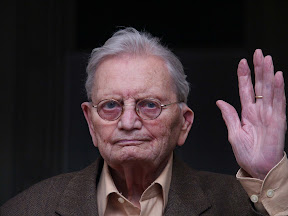Mijn vader werd 90: Een leven vol stedebouwkunde 19.2.07 [NL]

(Jan D. Riethof (*1917), 20 januari 2007)
Ik ga steeds meer op hem lijken.
Dat kun je op het fotootje in de kop van deze blog goed zien.
Jan Dirk Riethof werd geboren in Schiedam op 20 januari 1917 als derde zoon van Jan Riethof en Elisabeth den Uyl (inderdaad, familie van -). Zijn vader was gepensioneerd ex-KNIL-militair die zich moest behelpen met fragiele baantjes als portier en museumbewaker.
Hij groeide op in Utrecht onder armelijke omstandigheden.
Via de Mulo, wist hij toch HBS-B af te maken, maar kon wegens geldgebrek niet naar Delft om daar bouwkunde te studeren. Het werd de MTS.
Wat ook nogal tegen de familietraditie inging: Hij werd lid van de Arbeiders Jeugd Centrale (AJC, zie Wikipedia), de sociaal-democratische jeugdorganisatie, opgericht door Koos Vorrink e.a. naar het voorbeeld van de Duitse Wandervögel.
Daar leerde hij mijn moeder kennen en daaruit heeft hij ook zijn hele leven inspiratie geput voor zijn politieke en culturele standpunten.
Stadsontwikkeling in Amsterdam
In het verlengde van dergelijke ideeën over natuur, optimisme, gemeenschap en respect voor anderen, lag het 'Nieuwe Bouwen', de stroming in de architectuur en de stedebouw (urbanisme) die met kracht elke nostalgie verwierp en stadsplanning plus woningbouw wilde ontwikkelen vanuit strikt rationele gezichtspunten, zoals: orientatie van woongebouwen op de bezonning, functiescheiding tussen wonen, werken, recreatie en verkeer.
Brandpunt van deze stroming in Nederland was de sector Stadsontwikkeling van de Amsterdamse gemeentedienst der Publieke Werken.Voordat mijn vader daar als tekenaar aan de slag ging, had de gemeente al een bijzonder volledig Algemeen Uitbreidingsplan ontwikkeld, geheel volgens de principes van het 'Charter van Athene' en op wetenschappelijke leest geschoeid: de afdeling 'Survey' produceerde aan de lopende band statistieken en daarop gebaseerde berekeningen, die de grondslag vormden van het ruimtelijk beslag en de stedebouwkundige ordening. Anders dan meestal bij dergelijke plannen het geval is, is dit AUP tot diep in de zestiger jaren vrijwel naar de letter uitgevoerd. Ondanks de schokken van de Tweede Wereldoorlog en de woningnood erna. Je kunt zelfs het bouwen in de zeventiger jaren in de Bijlmermeer, niet voorzien in het AUP, zien als een extrapolatie van de AUP-beginselen, zij het tot in het absurde doorgevoerd.
Dichtbij de 'groten' van het Nieuwe Bouwen (mej. Mulder, Ir. C. van Eesteren, enz.) ontwikkelde mijn vader zich tot hoofd van een onderzoekafdeling binnen de survey van Stadsontwikkeling. Er werd verkeer geteld, er werden vierkante meters ruimtebehoeften aan sportterreinen uitgerekend - ik heb het een beetje meegemaakts, als ik als middelbare scholier vakantiebaantjes vervulde op "zijn" afdeling.
Weigering van de vertrutting in de stedebouw...
Een grote schok in zijn werkzame leven, betekende de terugkeer naar een ouderwetse en meer intuïtieve vorm van bouwen en stadsplanning rond het midden van de zeventiger jaren in Amsterdam. Functionele patronen werden verstoord door 'inbreiding', nieuwe woonbuurten werden ontworpen als replica's van oude Ijsselmeerstadjes, korte-termijnbeslissingen vervingen de zorgvuldige meerjarenplanning. Stadsontwikkeling werd feitelijk opgeheven, onderzoeksfuncties gingen naar een bestuursdienst, die bij de (politieke) dag leefde en ondergeschikt was aan wisselende modes en bestuurlijke persoonlijkheden.
Toen hij 62 jaar was, hield hij er plotseling mee op: Vervroegde pensionering was toen nog een goede optie. Dat was 28 jaar geleden - een mensenleeftijd. Van zijn plannen om te publiceren over de geschiedenis van Stadsontwikkeling kwam weinig terecht. Er waren veel andere zorgen. Langzamerhand werd het gepensioneerde leven gevuld met de activiteiten in een hechte groep van oud-AJCers, in het begin vooral uit Utrecht. Het waren mensen van de generatie van mijn ouders, of iets ouder. De meesten van hen zijn nu overleden.
Oud worden in een zich verhardende samenleving
Een zwakker wordende gezondheid, vereenzaming, verlies van functies slaan nu toe. Toegang tot een plek in één van de bejaarden- en verzorgingshuizen in Amsterdam, die mijn vader zelf zo zorgvuldig had helpen plannen, is er helaas niet van gekomen. Met hulp van mijn drie broers en hun gezinnen, die verspreid in Nederland wonen, en -sinds kort- met die van de wijkverpleging (Zie: e-urban Journal: Niederlände: Maffia in der häuslichen Krankenpflege, 12.2.07 [DE]), wordt een stukje leven in stand gehouden.
Het is bijna een hele eeuw, die u met een onhandig gebaar groet.
Uiterlijk lijk ik op hem. Maar ik knok ervoor, om anders oud te (kunnen) worden.
(Crossposted from: De Lage Landen - Mijn vader werd 90 jaar.)

 [EN]
[EN] [FR]
[FR] [DE]
[DE]


 Huib
Huib



